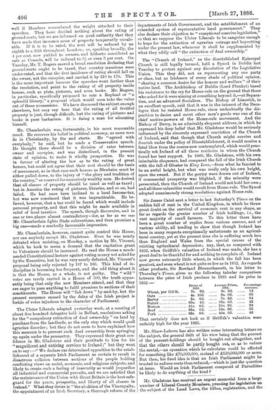The " Church of Ireland," as the disestablished Episcopal Church
is still legally termed, held a Synod in Dublin last Tuesday to protest against any dissolution of the Legislative Union. This they did, not as representing any one party or class, but as Irishmen of every shade of political opinion, "sharing a common desire for the honour and welfare" of their native land. The Archbishop of Dublin (Lord Plunket) based his resistance to the cry for Home-rale on the ground that those who asked for it were aiming at something beyond it,—at Separa- tion, and an advanced Socialism. The Bishop of Limerick, in an excellent speech, said that it was in the interest of the Deca- logue that he resisted Home-rule, since undoubtedly the dis- position to desire and covet other men's goods was one of the chief motive-powers of the Home-rule movement. And the Bishop of Derry, in an admirably eloquent address, in which he expressed his deep belief that Mr. Gladstone would be seriously influenced by the sincerely expressed conviction of the Church of Ireland, said that though that Church might survive and flourish under the policy of Disestablishment, it would receive a fatal blow from the course now contemplated, which would prac- tically rob Ireland of all those residents in whom the Church found her best support. In 1869, Mr. Gladstone, with his own inimitable eloquence, had compared the fall of the Irish Church with the fall of Gloster in King Lear,—from what he fancied to. be an awful height, but what was really only his own height, upon the sward. But if the gentry were drawn out of Ireland, if commeroial prosperity was blighted, if the minority were persecuted, then the Church of Ireland would not hold her own ; and all these calamities would result from Home-rule. The Synod adopted unanimously strong resolutions against Home-rule.


































 Previous page
Previous page